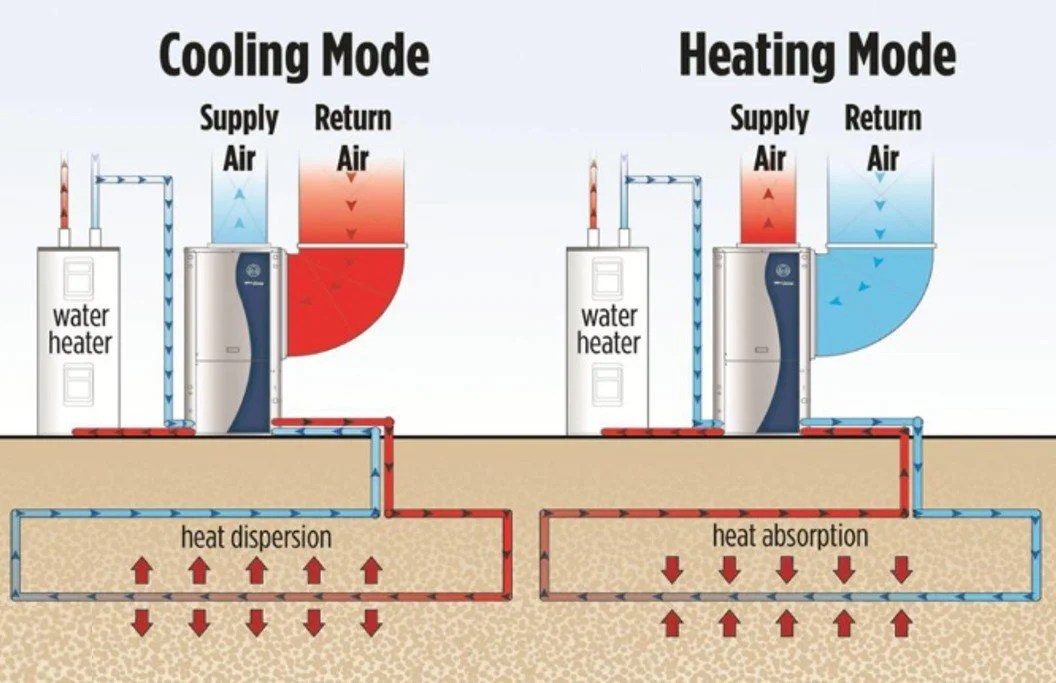Geothermal vs Air Source Heat Pumps - Air Conditioners
First of all, what is a heat pump? In simple terms, it is a device that transfers heat from one location to another by using a refrigeration cycle. They are very common, in fact, your refrigerator is a heat pump. It’s transferring heat out of the air inside the fridge and moving it to the outside of the fridge. That is why it’s blowing hot air out the backside of the unit.
Air source heat pump air conditioners are very common these days. They operate by pulling heat out of the air in your home and transferring it to the air outside. In the wintertime, they operate in reverse, pulling heat from the outside air and pumping it into your home. In extreme cold weather situations these units can have a hard time operating and might freeze up. When this happens the emergency heating coils located at the air handler unit inside the home kick on to provide heat.
Geothermal heat pump air conditioners operate similarly, but they transfer the heat to/from the ground. The temperature of the ground is around 65-70F year round. This means there is a significant temperature delta in the hot days of summer but also the bitter cold days of winter. This is one of the major reasons geothermal heat pumps are so efficient from an energy perspective.
Energy Efficiency & Benefits of Geothermal:
The energy efficiency of air conditioners is measured in SEERs (Seasonal Energy Efficiency Ratios). The higher the SEER the more efficient the system. Air source heat pumps typically have a SEER rating of 14-22. Geothermal heat pumps typically have a SEER rating of over 30. So they are significantly more efficient than air source units.
Another benefit of geothermal systems is the ability to harvest hot water from the internal heat exchanger. This is done with a separate potable water loop that is independent of the ground source loop.
The geothermal heat pump systems also boast a longer average lifetime than their air source counterparts. This is largely because the systems are so efficient and they do not have to work as hard to achieve the same amount of cooling or heating.
The Cost Implications:
All of the benefits of geothermal heat pumps do come at a cost. Roughly speaking, they run 2-3X the cost of an air source heat pump.
In the early 2000s and into the early 2010s, the cost of solar power was very expensive. So homeowners who were trying to cover all of their energy consumption with solar (net zero) were looking at the best ways of reducing the energy they were consuming. Investing in geothermal at that time made financial sense to achieve this goal. But the cost of solar was trending downward and by the mid-2010s solar had become so affordable, it no longer made financial sense to spend the extra money on geothermal. It made more sense to install a high SEER air source heat pump and add a few extra solar panels to the roof to offset the difference.
In today’s market, the additional cost of geothermal over air source will be tens of thousands of dollars. On large homes, it will easily be more than a $100K difference.
Serviceability:
Here is the other major pitfall of geothermal systems… when the system needs servicing in 10 years or so, will you be able to easily find someone to service it? And will they be able to easily source any needed parts to service your equipment?
I know homeowners who had systems installed in the early 2010s that needed servicing and had to wait 3-4 weeks for parts to arrive and for a qualified technician to service the units. This is concerning for the serviceability in another 10 years.
Recommendation:
HVAC is the biggest energy load on the house. If your goal is to build an energy-efficient home it makes sense to spend the extra money on a high SEER air source heat pump (19-22 SEER). But it doesn’t make sense to leap to geothermal, not financially, and not from a future serviceability standpoint.

